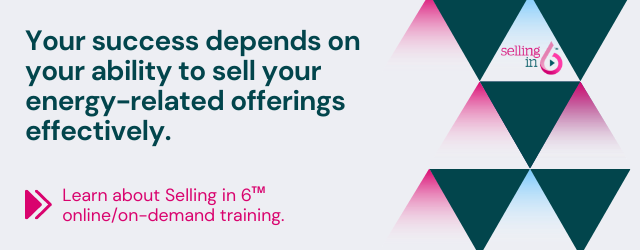Rejection is something that every sales professional faces throughout their career. There are some things you can do to prevent it. The first step is due diligence. When you have a conversation with your prospect, there are certain ways to figure out if they’re on the fence. Ask them how many energy projects have been approved in the recent past. Ask them about their process. Ask them which of their recent projects they’ve found to be most gratifying.

Here are some key questions you can use during your conversation:
- “Is there something missing from your business that has prompted you to contact me/us?”
- “What do you like most about the proposals you’ve received in the past? What have you liked the least?”
- “How will this decision be made?”
- “What other companies have been providing you with similar offerings?”
- “Have you been talking to other vendors for this particular project? If so, how many? Who? What were the highest and lowest points of those conversations?”
These last questions are key. If you think they haven’t been searching for other options, you’re kidding yourself. Your prospect has most likely met with other people and formed an opinion. It would be very helpful to know what that opinion is. Realize that some prospects may provide incomplete or even potentially misleading answers to some of these questions, particularly if you haven’t developed sufficient rapport before asking them.
It’s also helpful to know about neuro-linguistic programming and micro facial expressions, noting how people’s eyes move or the language they use when responding, or subtle facial twitches that suggest which emotions they may be experiencing as they answer. Realizing that there is a lot more to a conversation than words is the first step to experiencing deeper communication.
Time is an important factor as well. If you wait too long after a presentation before following up, chances are you’re going to lose the sale. However, if you follow up within a day and get passed over, that’s when it becomes suspicious. There’s a high probability that your prospect had already decided to go with another company and simply chatted with you to comparison shop. Asking the right questions prior to agreeing to meet helps insulate you from just being the second or third bid your prospect needs before they can check a box in their procurement process.
Your ultimate goal is to be the vendor who will help your prospect make a decision. You need them to select not only the best vendor (ideally, you!), but also the right solution, warranty, service, and even financing if necessary. There are many ways your prospects can harm themselves if they are not skilled at evaluating the options properly. As they say, all aspirin is not alike. Energy solutions vary in sometimes subtle ways that are opaque to an uninformed buyer.
This is why you should bring your particular know-how to the conversation, as well as the right questions and information. You can’t always avoid rejection. However, Step 1 is to position yourself as a knowledgeable peer whose role it is to ensure that your prospect makes the most informed decision possible. With that positioning, your positive attitude and professional demeanor will dramatically increase your chances of winning the business.







